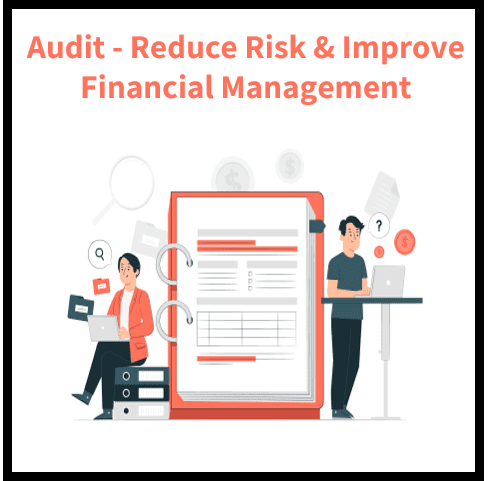The ability to monitor and exercise control over key resources is paramount for any business. A properly implemented risk management program will assist you in identifying and mitigating risks to your company’s financials. If you’re just getting started with your risk management program, you’ll want to begin by learning how to audit your business.
This will not only give you insight into your company’s risk management program, but it will also serve as a great jumping off point for learning how to implement one of your own. If you’ve been in business for a while, you may have already begun auditing your business. But, it’s never to stay. As your company grows, it’s important to audit to ensure that you’re not missing any important risks. Here’s what you need to know about auditing your business.
Image Source: Freepik
What is a Risk Management Audit?
A risk management audit is an in-depth examination of your business by a qualified person who is not a part of your management team. What they look at will vary depending on the risks that you’re trying to mitigate.
You’ll need to evaluate your business’s assets, liabilities, operations, financials, and compliance with the law. This is all part of the audit process.
Why is Auditing Important?
To be successful in today’s market, your business must be able to demonstrate a level of financial health that can withstand any short-term challenges. To do this, you must have policies and procedures in place to ensure that your assets, liabilities, operations, and financials are accurate.
And auditing ensures that these are in place, as well as the controls that are in place to ensure that these values are successful.
Helping your Auditors Identify and Report Issues
One of the best things about auditing your business is that it helps your auditors identify and report issues. This doesn’t just mean that they identify problems, but they also help your management identify and report the root causes of any issues so that they can be addressed. When your auditors identify issues, they can report them to you.
When your management reports issues, your auditors can help them identify the root causes so that the issues are easier to avoid in the future. When your business is audited, you’ll have a chance to review the report to be sure that all areas of your organization are in good standing. You’ll also have a chance to ask any questions you have.
How to Run an Audit
Depending on the seriousness of the issues that you’re auditing, you may want to have your auditors run the audit themselves. In this case, you’ll need to provide them with all of the necessary information so that they can fully understand the nature of your business. Otherwise, you may want to have the auditors run a “screen audit” in which they look only at the highlights of your books and records.
During a screen audit, your auditors will be looking for obvious issues such as misspelled words, incorrect numbers, and illegible signatures. But they’ll also want to look behind the scenes at your company’s operations to ensure that your business is functioning as intended. Because your auditors are looking for problems, they’ll be inspecting your books and records to make sure that you haven’t missed any important items.
Finding and Monitoring Risk
Once your audit is complete, you’ll want to start looking for risks that may be causing your company headaches. These risks may be internal (such as unions busting, work schedules, and hours) or external (such as a competitor’s new product). Once you’ve identified the areas of risk that are causing concern, you’ll want to take steps to address them.
Depending on the nature of the risk, you may want to have your auditors provide you with a written report that includes the risk’s details, the steps that you’ve taken to address the risk, and the results that have followed.
What does an audit look at?
During an audit, your auditors will be looking behind the scenes at your company to ensure that your business is functioning as intended. They’ll be inspecting your books and records to make sure that you haven’t missed any important items. Your auditors may want to talk to employees to get their impressions of how the business is running. This is called “managing the risk” and it’s the audit’s purpose.
Your auditors may want to talk to vendors to get their thoughts on how their company is performing. This is called “performing the audit” and it’s the purpose of the “screen audit.”
What to include in your Risk Audit
As your risk management program grows, you’ll want to audit your business to ensure that you’re not missing any important risks.
While the basics of your risk management program are always good to start with, there are a few items that you’ll want to include in your audit to further your risk management program: Assets Your assets are the things that are worth keeping and things that are not worth losing. When auditing your assets, look for obvious signs of wear and tear. For example, signs that your office equipment is broken or a computer has been out of power for a long time.
If you find these items, make sure to get them repaired or replaced as soon as possible. Your assets are the things that are worth keeping and things that are not worth losing. When auditing your assets, look for obvious signs of wear and tear. For example, signs that your office equipment is broken or a computer has been out of power for a long time. If you find these items, make sure to get them repaired or replaced as soon as possible.
Liabilities If you have any liabilities, such as a past due bill or a mortgage that needs paying, let your auditors know. Make sure to put them in the right category so that they can easily differentiate between current and past liabilities. If you have any liabilities, such as a past due bill or a mortgage that needs paying, let your auditors know.
Make sure to put them in the right category so that they can easily differentiate between current and past liabilities. Operations Your operations are the steps that your business takes to get things done. Make sure to look behind the scenes to see if your business is actually doing anything. A good way to do this is to have your auditors “screen-in” your business so that they can look behind the scenes at your operations and see what’s happening on a day-to-day basis. Your operations are the steps that your business takes to get things done.
Make sure to look behind the scenes to see if your business is actually doing anything. A good way to do this is to have your auditors “screen-in” your business so that they can look behind the scenes at your operations and see what’s happening on a day-to-day basis.
Summing up
Depending on your business, you may want to include more items in your audit than is usually necessary. This is normal, and it’s part of the process of auditing your business. To be successful in today’s market, your business must be able to demonstrate a level of financial health that can withstand any short-term challenges.
To do this, you must have policies and procedures in place to ensure that your assets, liabilities, operations, and financials are accurate. And auditing ensures that these are in place, as well as the controls that are in place to ensure that these values are successful. That’s all there is to it. Now it’s time to get auditing.





25 thoughts on “Auditing Your Business: A Comprehensive Guide to Reducing Risk and Improving Financial Management”
… [Trackback]
[…] Find More to that Topic: skillfine.com/business-audit-guide/ […]
… [Trackback]
[…] Here you can find 18316 more Information to that Topic: skillfine.com/business-audit-guide/ […]
… [Trackback]
[…] Here you will find 21557 additional Info to that Topic: skillfine.com/business-audit-guide/ […]
… [Trackback]
[…] Here you can find 39478 additional Info to that Topic: skillfine.com/business-audit-guide/ […]
… [Trackback]
[…] Find More on to that Topic: skillfine.com/business-audit-guide/ […]
… [Trackback]
[…] Information to that Topic: skillfine.com/business-audit-guide/ […]
… [Trackback]
[…] Read More Information here to that Topic: skillfine.com/business-audit-guide/ […]
… [Trackback]
[…] There you will find 85301 additional Information to that Topic: skillfine.com/business-audit-guide/ […]
… [Trackback]
[…] Info to that Topic: skillfine.com/business-audit-guide/ […]
… [Trackback]
[…] Find More on that Topic: skillfine.com/business-audit-guide/ […]
… [Trackback]
[…] Find More on to that Topic: skillfine.com/business-audit-guide/ […]
… [Trackback]
[…] Read More on on that Topic: skillfine.com/business-audit-guide/ […]
… [Trackback]
[…] Read More Information here on that Topic: skillfine.com/business-audit-guide/ […]
ROV ID Shop
บริการ ROV ID Shop ด้วยระบบออโต้ 24 ชม. รับประกันหลังการขาย
I really like and appreciate your article post.Thanks Again.
Your article helped me a lot, is there any more related content? Thanks!
Can you be more specific about the content of your article? After reading it, I still have some doubts. Hope you can help me.
Thanks for sharing. I read many of your blog posts, cool, your blog is very good.
Can you be more specific about the content of your article? After reading it, I still have some doubts. Hope you can help me.
You’re so awesome! I don’t believe I have read a single thing like that before. So great to find someone with some original thoughts on this topic. Really.. thank you for starting this up. This website is something that is needed on the internet, someone with a little originality!
682661 270146Cool post thanks! We think your articles are excellent and hope much more soon. We really like anything to do with word games/word play. 510098
67416 237568great . Thanks for informations . Ill be back. Thanks once more 619595
943083 61101extremely nice publish, i surely really like this web site, carry on it 92420
673584 127074I believe that a simple and unassuming manner of life is greatest for every person, best both for the body and the mind. 783119
231089 334004In todays news reporting clever journalists work their very own slant into a story. Bloggers use it promote their works and many just use it for fun or to stay in touch with friends far away. 476796